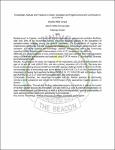Knowledge, Attitude and Practices on Water, Sanitation and Hygiene among the Community in Lira District
Date
2022Author
Akullu, Milly Grace
Akech, Stella Immaculate
Kigongo, Eustes
Metadata
Show full item recordAbstract
Background: In Uganda, more than half of the households use unimproved sanitation facilities,
with only 19% of the households owning improved facilities, leading to the prevalence of
sanitation-related diseases among the general population. The Government of Uganda has
implemented community-led total sanitation by engaging the community in sustaining their own
sanitation. The study assessed the knowledge, attitudes and practices among the community
regarding WASH following the implementation of the CLTS program in Lira District.
Methods: The study employed a cross-sectional design. Data was collected from 528 respondents
using a close-ended questionnaires and analyzed using STATA version 17 at univariate, bivariate,
and multivariate levels.
Results: According to the study, the majority of the respondents (181;35.6%) were between the
ages of 18 and 30, male (305;57.9%), and had a primary education (371;70.1%). The study also
found out that earning between 50,000 and 100,000 Ugandan shillings (AOR=0.39, CI: 0.19-0.83),
not knowing ways of preventing water borne diseases (AOR=0.29, CI: 0.14-0.61), not feeling the
importance of having hand washing facilities (AOR=0.14, CI: 0.06-0.36) and not having a tippy
tap (AOR=0.33, CI: 0.17-0.66) were associated with poor wash practices.
Conclusion: Therefore, the researcher concluded that the WASH practices of community
members were suboptimal and below the MOH target of the appropriate hygiene practice of
WASH.
Recommendations: Through this finding, better interventions and policies to reduce the burden
of WASH related diseases be intensified, and also there is a need to intensify sensitization on
water-related diseases and prevention, as well as enforce the installation, use and sustainability of
hand washing facilities among the community in Lira District.
Key words: Knowledge, Attitude, Practices on Water, Sanitation and Hygiene

